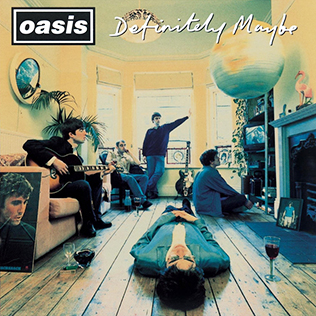
Definitely Maybe is the debut studio album by the English rock band Oasis, released on 29 August 1994 by Creation Records. The album features Noel Gallagher on lead guitar, backing vocals and as chief songwriter, Liam Gallagher on lead vocals, Paul "Bonehead" Arthurs on rhythm guitar, Paul "Guigsy" McGuigan on bass guitar and Tony McCarroll on drums.

Oasis are an English rock band formed in Manchester in 1991. The group initially consisted of Liam Gallagher, Paul "Bonehead" Arthurs (guitar), Paul "Guigsy" McGuigan and Tony McCarroll (drums), with Liam asking his older brother Noel Gallagher to join as a fifth member a few months later to finalise their formation. Noel became the de facto leader of the group and took over the songwriting duties for the band's first four albums. They are characterised as one of the defining and most globally successful groups of the Britpop genre.

Heathen Chemistry is the fifth studio album by English rock band Oasis. It was released on 1 July 2002 by Big Brother Recordings. It is the first Oasis studio album recorded with guitarist Gem Archer and bassist Andy Bell, who both joined the band after work on previous album Standing on the Shoulder of Giants had been completed. It is the last album to feature longtime drummer, Alan White, who left in early 2004, with Noel Gallagher citing White's lack of commitment to the band as the reason for leaving.

William John Paul Gallagher is an English singer and songwriter. He is the lead singer of the rock band Oasis, which he co-founded in 1991. He fronted the rock band Beady Eye from 2009 to 2014, before starting a successful solo career in 2017.
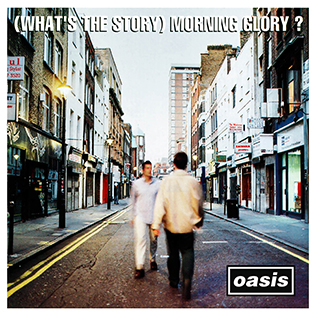
(What's the Story) Morning Glory? is the second studio album by the English rock band Oasis. Released on 2 October 1995 by Creation Records, it was produced by Owen Morris and the group's lead guitarist and chief songwriter Noel Gallagher. The structure and arrangement style of the album was a significant departure from the band's previous album, Definitely Maybe (1994). Gallagher's compositions were more focused in balladry and placed more emphasis on "huge" choruses, with the string arrangements and more varied instrumentation contrasting with the rawness of the group's debut album. Morning Glory was the group's first album with drummer Alan White, who replaced Tony McCarroll.
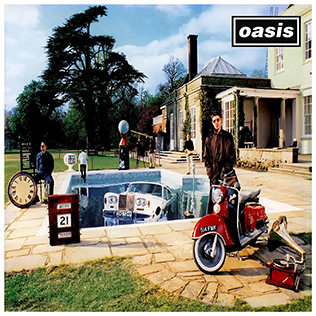
Be Here Now is the third studio album by the English rock band Oasis, released on 21 August 1997 by Creation Records. The album was recorded at multiple recording studios in London, including Abbey Road Studios, as well as Ridge Farm Studio in Surrey. Although most tracks retain the anthemic quality of previous releases, the songs on Be Here Now are longer and contain many guitar overdubs. Noel Gallagher said this was done to make the album sound as "colossal" as possible. The album cover features a shot of the band members at Stocks House in Hertfordshire. It is the last Oasis studio album to feature founding members guitarist Paul "Bonehead" Arthurs and bassist Paul "Guigsy" McGuigan as the two left in 1999.

Standing on the Shoulder of Giants is the fourth studio album by English rock band Oasis, released on 28 February 2000. It was the band's first album under their new record label Big Brother Recordings. In the year preceding the album's release, Alan McGee closed Creation Records, and Oasis had lost two founding members and hired new producer Mark "Spike" Stent to replace Owen Morris.

"Cigarettes & Alcohol" is a song by the English rock band Oasis, written by Noel Gallagher. It was released on 10 October 1994 by Creation Records as the fourth and final single from their debut album, Definitely Maybe (1994), and their second to enter the UK top ten in the United Kingdom, peaking at number seven, eventually spending 79 weeks on the charts. On 13 March 2020, nearly 26 years after its release, the song was certified Platinum, indicating 600,000 sales.

Don't Believe the Truth is the sixth studio album by English rock band Oasis. It was released on 30 May 2005 by Big Brother Recordings. It reached number one in the UK Albums Chart with first week sales of 237,865, and is the 32nd fastest selling album ever in the UK. The album entered the US charts at number 12, with 65,000 copies sold in the first week, the highest any Oasis album had reached there since 1997's Be Here Now, although its chart stay was brief. Don't Believe the Truth went triple platinum in the UK in the first week of 2006, and in the US has sold more than 200,000 copies.

"Acquiesce" is a song by English rock band Oasis, written by Noel Gallagher. The song originally appeared as the B-side to Oasis' first UK number-one single, "Some Might Say", in 1995. Its popularity led to it being included on the B-sides compilation album The Masterplan, released in 1998, after being voted for inclusion by fans of the band on their official website.

The English rock band Oasis have released seven studio albums, two live albums, five compilation albums, six video albums, one extended play, twenty seven singles which includes one double single, nineteen promotional singles and thirty-six music videos. As of 2024, the band has sold over 75 million records worldwide, making them one of the best-selling music artists of all time and been named by Guinness World Records as the most successful act in the United Kingdom between the years 1995 and 2005. Oasis had 22 consecutive UK top 10 hits between 1994 and 2008. Oasis was formed in 1991 by vocalist Liam Gallagher, guitarist Paul "Bonehead" Arthurs, bassist Paul "Guigsy" McGuigan and drummer Tony McCarroll – they were later joined by guitarist and songwriter Noel Gallagher. The band signed to Creation Records in May 1993 and released their debut single "Supersonic" the following year; it peaked at number 31 in the United Kingdom. Follow-up singles "Shakermaker" and "Live Forever" became UK top 15 hits, with the latter also attaining success in the United States. Definitely Maybe, the band's debut studio album, topped the UK Albums Chart and went on to be certified nine times platinum by the British Phonographic Industry (BPI).

Stop the Clocks is a compilation album by English rock band Oasis. It was released on 20 November 2006 by Big Brother Recordings. The "retrospective collection" is an 18-track double album with the featured songs chosen by Noel Gallagher. It was certified 5× Platinum in the United Kingdom.
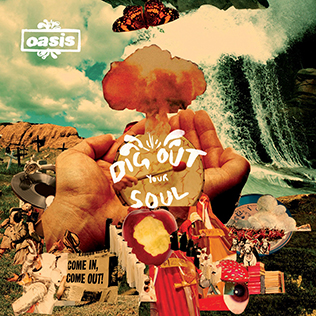
Dig Out Your Soul is the seventh studio album by English rock band Oasis, and the last before their 15-year breakup from August 2009 to August 2024. It was released on 6 October 2008 by Big Brother Recordings. The album was recorded between August and December 2007 at Abbey Road Studios in London, and mixed in January and March 2008 at The Village Recorder in Los Angeles. Production was handled by Dave Sardy who had previously produced much of the group's sixth studio album, Don't Believe the Truth (2005). Lead guitarist Noel Gallagher wrote a majority of the songs, while three were written by Liam Gallagher as well as one contribution each from Gem Archer and Andy Bell.

Time Flies... 1994–2009 is a compilation album by English rock band Oasis. Released on 14 June 2010 by Big Brother Recordings, the album contains all 27 UK singles released by the band between 1994 and 2009, including "Whatever" and "Lord Don't Slow Me Down", which had previously never appeared on an Oasis studio album. "Sunday Morning Call" is not listed anywhere on the artwork but appears as a hidden track on track 14 of the second disc.

Different Gear, Still Speeding is the debut studio album by English rock band Beady Eye, released on 28 February 2011. It debuted at number three in the UK Albums Chart selling 66,817 in the first week. As of August 2012, the album has sold 174,487 copies in the UK. On Different Gear, Still Speeding, all members contributed to the instrumentation, much like the later albums of Oasis.
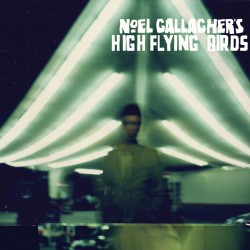
Noel Gallagher's High Flying Birds is the debut studio album by English rock band Noel Gallagher's High Flying Birds. Released on 17 October 2011, it is the first studio album released by frontman Noel Gallagher since his departure from Oasis in August 2009 and the group's eventual dissolution.

Noel Gallagher's High Flying Birds are an English rock band formed in 2010 as the solo moniker of Oasis songwriter, guitarist, and vocalist Noel Gallagher. The touring band consists of former Oasis members Gem Archer (guitar), Mike Rowe (piano), and Chris Sharrock (drums), as well as former Zutons bassist Russell Pritchard. The band has also had a variety of guests contribute to albums such as the Crouch End Festival Chorus, Amorphous Androgynous, Johnny Marr, and Paul Weller.

Chasing Yesterday is the second studio album by English rock band Noel Gallagher's High Flying Birds. Written and produced by frontman Noel Gallagher, the album was recorded from 2012 to 2014 at Strangeways and Abbey Road Studios in London. It was released on 2 March 2015 by Gallagher's record label Sour Mash Records, preceded by the singles "In the Heat of the Moment" and "Ballad of the Mighty I". Chasing Yesterday topped the UK Albums Chart in its first week of release.

Who Built the Moon? is the third studio album by English rock band Noel Gallagher's High Flying Birds. Produced by David Holmes, it was released on 24 November 2017, through Gallagher's label Sour Mash Records. Four singles were released from the album; "Holy Mountain", "It's a Beautiful World", "She Taught Me How to Fly" and "If Love Is the Law".
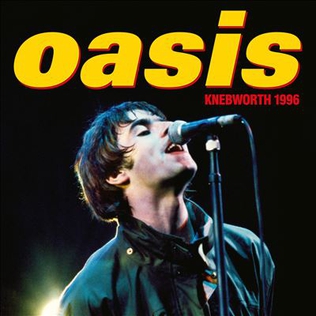
Knebworth 1996 is a 2021 live album and documentary film by English rock band Oasis. The film was directed by Jake Scott and released on 23 September 2021, while the album was released on 19 November 2021. Both were recorded on 10–11 August 1996 at the Knebworth Festival at Knebworth House, England. By the week after its release, the film had become the highest-grossing documentary of 2021 in the UK.




















